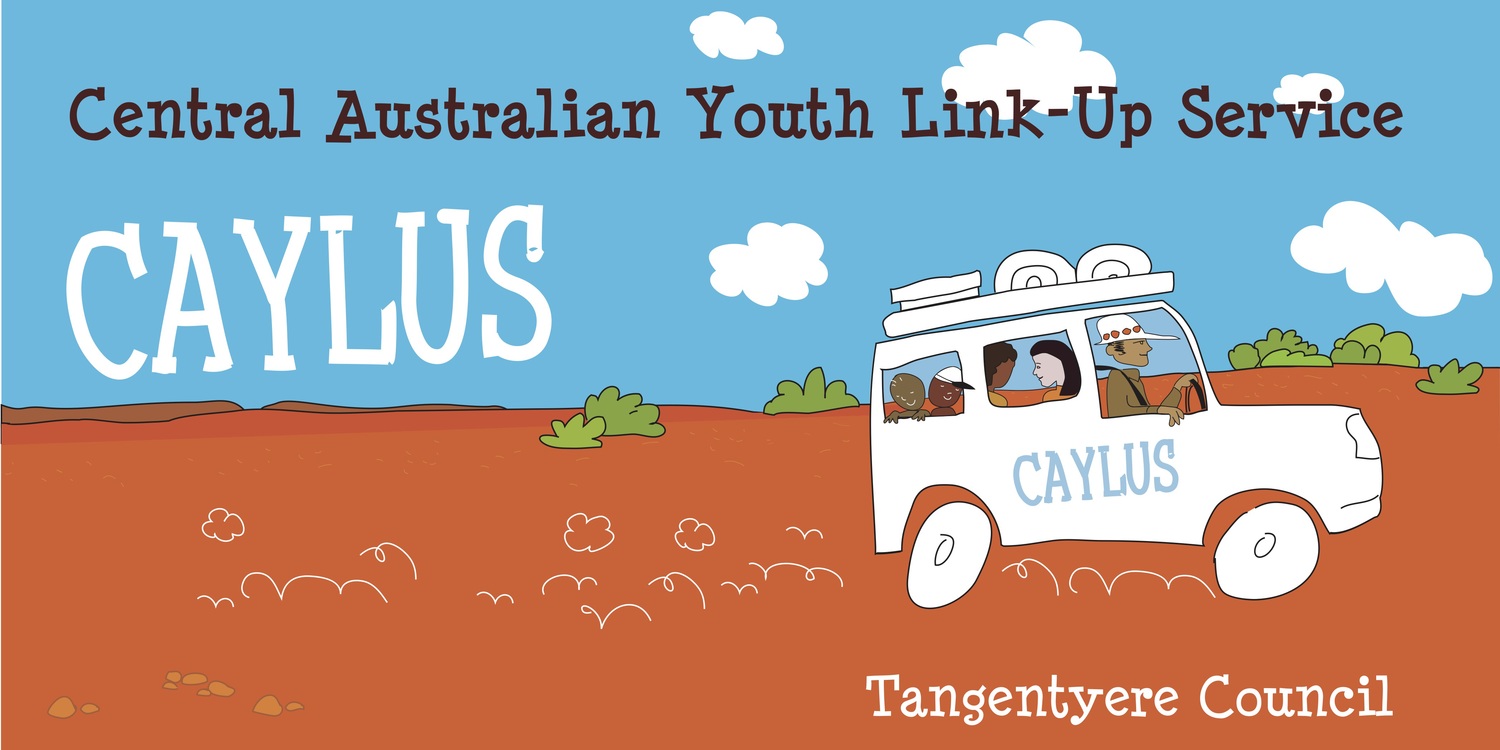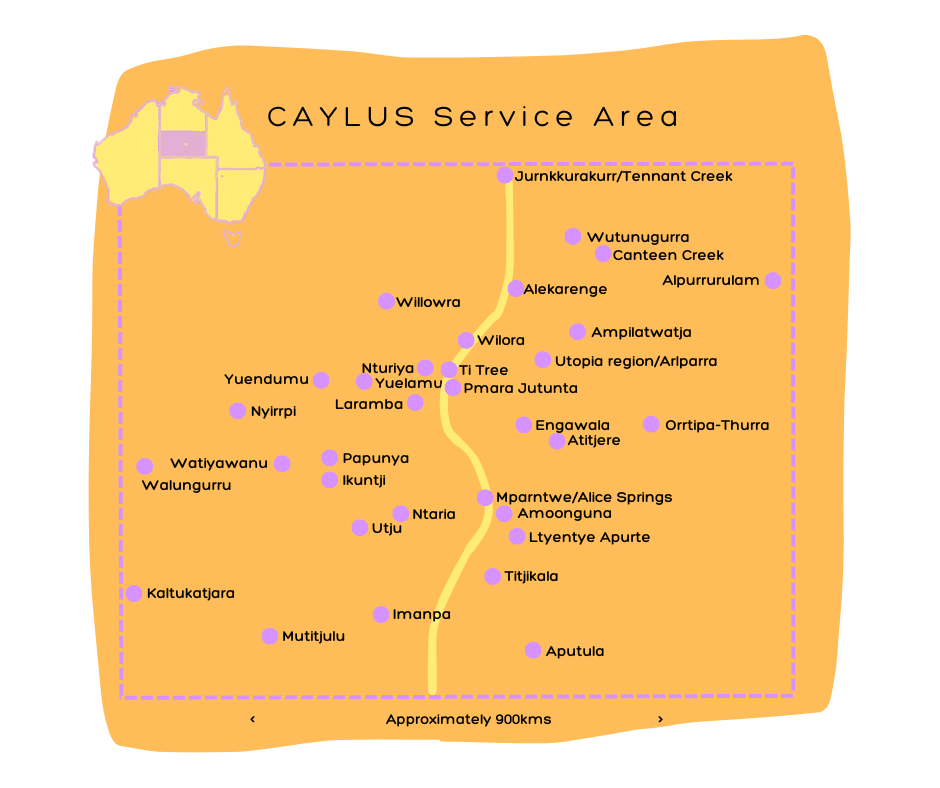

About CAYLUS
CAYLUS has operated Since November 2002.
About CAYLUS
CAYLUS has operated Since November 2002.
About CAYLUS
CAYLUS is a division of Tangentyere Council and takes direction from a steering committee made up from representatives of the following agencies and communities:
Alice Springs Youth Accommodation and Support Services (ASYASS)
Ngaanyatjarra Pitjantjatjara Yankunytjatjara (NPY) Women's Council
Southern Tanami Kurdiji Indigenous Corporation (STKIC)
The CAYLUS Service area spans communities across the bottom half of the Northern Territory. CAYLUS only works in communities at the request of local people and agencies, over the 19 years that we have operated we have gradually extended our services to new sites. While CAYLUS primarily services this region, we have occasionally provided assistance to communities further away. In the NT, we have assisted Darwin, East Arnhem, Tennant Creek and Katherine, and in WA, Kiwirrkurra, Balgo and Jigalong.
Liam Campbell
CAYLUS Operations Manager
liam@caylus.org.au
Co Managers
Bianca Rayner
CAYLUS Business Manager
bianca@caylus.org.au
CAYLUS supported initiatives have included developing
Rehabilitation services, youth programs, a responsible retail of solvents program, infrastructure and maintenance, night patrols, policing initiatives, youth diversion, staff recruitment and youth worker traineeships, mentoring and workshops, computer rooms, internet access and cyber safety, menstrual hygiene management resources, COVID-19 support, local interpreter services, football leagues and carnivals, literature production, and film and radio projects in local languages.
Youth Programs
Whilst many supply-reduction measures specifically targeted inhalants, the demand-reduction measures such as development of community-based recreation and youth programs have had a myriad of other health, substance misuse prevention and community safety outcomes.
For an in depth look at the CAYLUS model and approach check out Gillian Shaw’s paper The Provision of Support and Advocacy for Indigenous Young People on a Regional Basis
History
CAYLUS commenced operation during a period when petrol sniffing was an enormous issue across much of Central Australia. At this time availability of reliable youth programs in our service region was also limited. CAYLUS staff initially promoted use of aviation gas as an alternative fuel that was less intoxicating if sniffed, along with developing youth programs and promoting the use of the Misuse of Drugs Act (NT) to prevent deliberate dealing and supply of fuel and other substances to sniff.
CAYLUS staff worked closely with families to facilitate access to rehabilitation programs and worked with these services to varying degrees to help develop their programs and services. This approach builta more systematic response to sniffing and helped reduce the damage that was being done, it didn't however greatly reduce prevalence of sniffing in many communities as standard unleaded was still readily available.
Youth programs across the region run regular day and nighttime activities
Atitjere Youth Program, Central Desert Regional Council
As CAYLUS has supported remote communities efforts to make high-risk substances harder to access for sniffing, we have also needed to work with retailers in the regional centre Alice Springs to ensure that such products are well managed there also. The CAYLUS Volatile Substances Supply Reduction worker works supporting retailers in Alice Springs to manage products well, as a part of this work we developed a range of resources for retailers but importantly have been available and responsive to retailers needs including providing practical assistance where we can.
In 2004/05 CAYLUS staff worked with other stakeholders to advocate to the NT government for a range of measures including better data collection, better policing around petrol sniffing and better rehabilitation options. This resulted in the introduction of the NT Volatile Substance Abuse Prevention Act 2005 and a complementary investment in support programs by the NT government. One of the most useful outcomes of this legislation has been that it gives communities the ability to make laws around the management of volatile substances. Some communities used these powers to make possession of standard unleaded petrol illegal altogether within their bounds, thereby making petrol dealing far more difficult.
With the advent of Opal/ Low Aromatic Fuel in 2005, it became feasible for the first time to implement a non-intoxicating fuel across the region. CAYLUS staff worked with communities promotingand supporting the use of the fuel. As a part of the Opal Alliance we also advocated for a change in Commonwealth government policy, first to allow roadhouses to use the fuel and eventually to a region wide rollout in Central Australia. For a full account of this process see CAYLUS and the Opal Alliance - by Blair McFarland.
The regional roll out of Opal has been a major success, the 2009 Evaluation of the Impact of Opal Fuel found that across all sites there has been a 70% reduction in prevalence of petrol sniffing and that in Central Australia this has been in excess of 90%. It has been very gratifying to be able to see the change on the ground in communities as a result. See the video from Papunya below to hear an account from that community. Our advocacy work in this area continues though, as a small number of retail outlets continue to refuse to stock the fuel despite the likely benefit to nearby communities. CAYLUS staff continue to work toward budiling availability of good quality youth programs for youth and families in all communities in order to engage youth in positive activities and programs. There is currently no Government commitment that ensures such services are available to all remote NT Youth. For further information on the case of Youth Services see the 2011 CAYLUS discussion paper Youth Development In Central Australia Beyond 2012.
For further information on the case of Youth Services see the 2011 CAYLUS discussion paper Youth Development In Central Australia Beyond 2012.
CAYLUS operates with funding from the Australian Government, Northern Territory Government, the Warlpiri Education and Training Trust and contributions from a range of institutional and private donors.

